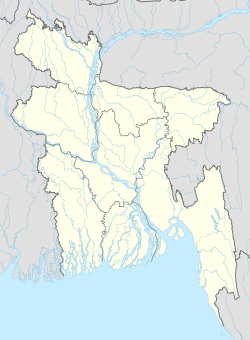Muladi Upazila
Muladi
মুলাদি | |
|---|---|
| Coordinates: 22°54.9′N 90°24.9′E / 22.9150°N 90.4150°E | |
| Country | |
| Division | Barisal Division |
| District | Barisal District |
| Area | |
| • Total | 261.02 km2 (100.78 sq mi) |
| Population (1991) | |
| • Total | 171,948 |
| • Density | 659/km2 (1,710/sq mi) |
| Time zone | UTC+6 (BST) |
| Website | Official Map of the Muladi Upazila |
Muladi (Bengali: মুলাদি) is an Upazila of Barisal District in the Division of Barisal, Bangladesh.[1]
Geography
Muladi is located at 22°54′55″N 90°24′54″E / 22.9153°N 90.4150°E. It has 32,515 households and a total area of 261.02 km2. It borders Gosairhat Upazila on the north, Barisal Sadar Upazila on the south, Hizla and Mehendiganj Upazilas on the east and Kalkini, Gournadi and Babuganj Upazilas on the west.
Demographics
According to the 1991 Bangladesh census, Muladi had a population of 171,948. Males constituted 50.49% of the population, and females 49.51%. The population aged 18 or over was 80,369. Muladi had an average literacy rate of 31.4% (7+ years), compared to the national average of 32.4%,[2] comprising 36.5% among males and 26.2% among females. 97.79% of the population were Muslim, 2.16% were Hindu and 0.05% followed other beliefs.
Main occupations
51.17% of the population work in agriculture, 20.67% as agricultural labourers, 3.18% as wage labourers, 7.52% in commerce, 7.13% in services, 2.5% in fishing and 7.83% in other occupations.
Land use
Cultivable land covers 26159.45 hectares and fallow land 237.56 hectares; single crop 42%, double crop 50% and treble crop land 8%. 74% of cultivable land is under irrigation.
Land control
Among the peasants, 29% are landless, 7.09% marginal, 32.82% small, 27% intermediate and 4.09% rich; cultivable land per head 0.14 hectare.
Land value
The market value of land of the first grade is approximately 5000 Tk per 0.01 hectares.
Crops and fruits
The main crops are Paddy, wheat, sweet potatoes, pulses, brinjal and betel leaves, and the main fruits are mangoes, jackfruits, bananas, blackberries, coconuts, lychee, palms, betel nuts and amra. The extinct or nearly extinct crops are Jute, tobacco, mustard seeds, groundnuts, garlic, sugar cane, arahar, china and kaun.
Administration
Muladi thana was established in 1967 and was turned into an upazila in 1983.
Muladi Upazila is divided into Muladi Municipality and seven union parishads: Batamara, Char Kalekhan, Gachhua, Kazir Char, Muladi, Nazirpur, and Nazirpur. The union parishads are subdivided into 77 mauzas and 102 villages.[3]
Upazila Chairman : Tariqul Hasan Khan Mithu
Woman Vice Chairman :Samima Nasrin
Vice Chairman :
Upazila Nirbahi Officer (UNO) : Abdullah Al Masud
Education
There are 6 colleges, 30 high schools, 5 junior schools, 77 government primary schools, 50 non-government primary schools, 17 madrasas and a kindergarten. The noted educational institutions are Bheduriachar Government Primary School (1892) and Tayak Tomchar Government Primary School (1845).
Educational institutions in Muladi Upazila include:
- Muladi Degree College
- Charlakhsmipur Fazil Madrasah(Eestablished -1937)
- Laxmipur High School (Established:1964),Luxmipur
- Laxmipur Govt.Primary School (Established:1956),Luxmipur
- Arif Mahmud Degree College
- Muladi M.J Govt. High School (Bir Sreshtho and martyr of Bangladesh Liberation War Mohiuddin Jahangir was a student of this school)
- Purba Hosnad Moha Biddaloy, Gachua, Hosnabad
- Gachua Abdul Kader High School (Established: 1971)
- Paiksha Hosnabad High School
- Muladi Islamia Senior Madrassa
- South Kazirchar High School (Established: 1939)
- Kazirchar Secondary School (established: 1939)
- Bahadurpur Fazlur Rahim Sharif Secondary School (Established: 1963)
- Nazirpur United Degree College
- Nazirpur High School
- Nazirpur Girls' School
- Jalalpur Secondary School
- Nazirpur Boro Bari Shikhon School
- Ramarpole Aferuddin Memorial High School (founded by Mohammad Abul Kashem Laal Miah Mridha)
- Muladi Degree College
- A.B.R. High School, Alimabad, Jagorani High School, Tayka
- Islamia Shishu Shodon (orphanage), founded by Faruqe Ahmed at East Nazirpur,
- Banimordon High School, Banimordon
- Banimordon Fazil Madrassa
- Shaheed Altaf Mahamud Secondary School.
- VP-Md. Rana Khan-Charkalekhan Ideal Degree College
- Charkalekhan Ideal High School
- Charkalekhan Nesaria Fazil Madrasa
- Sayeder Gaon High School (Established:1928)
- BDCH Complex Including A high school, a govt. primary School.
- Safipur High School
- 22no.Safipur government primary school.
- Haji Badrul Hossain Degree College
See also
References
- ^ Md. Mizanur Rahman (2012). "Muladi Upazila". In Sirajul Islam and Ahmed A. Jamal (ed.). Banglapedia: National Encyclopedia of Bangladesh (Second ed.). Asiatic Society of Bangladesh.
- ^ "Population Census Wing, BBS". Archived from the original on 2005-03-27. Retrieved November 10, 2006.
- ^ "District Statistics 2011: Barisal" (PDF). Bangladesh Bureau of Statistics. Archived from the original (PDF) on 13 November 2014. Retrieved 14 July 2014.


